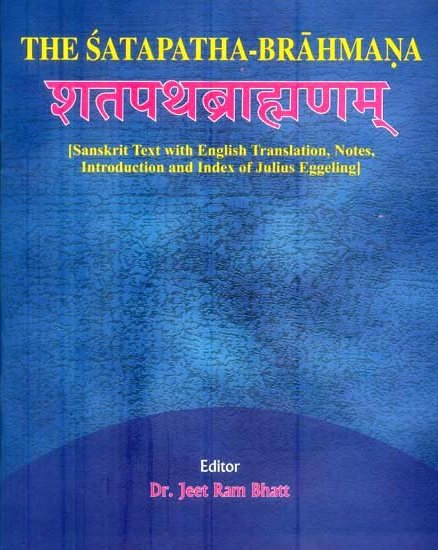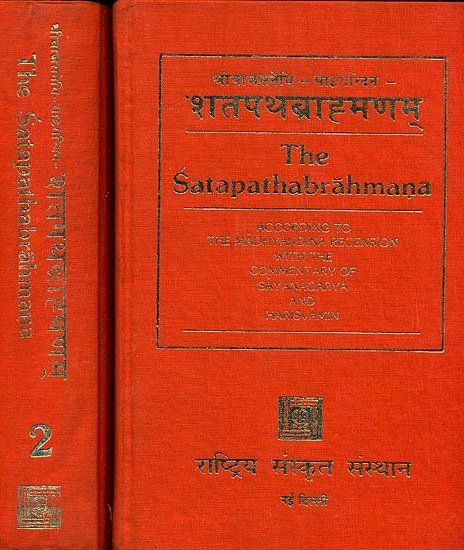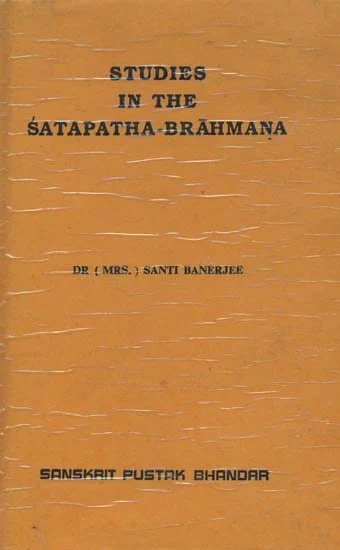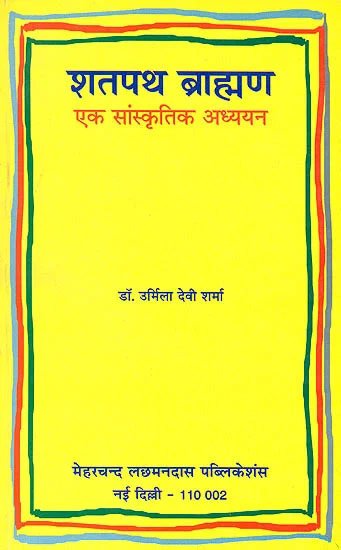Satapatha-brahmana [sanskrit]
147,532 words | ISBN-10: 812080113X | ISBN-13: 9788120801134
The Sanskrit text of the Satapatha-brahmana: One of the largest works in the category of Vedic (Brahmaic) literature, narrating in extensive detail the various rites, constructions, chants and utensils to be used in Hindu ceremonies. Alternative titles: Śatapathabrāhmaṇa (शतपथब्राह्मण), Śatapatha-brāhmaṇa (शतपथ-ब्राह्मण) Shatapathabrahma (shatapatha).
Verse 1.2.4.16
sa praharati | pṛthivi devayajanyoṣadhyāste mūlam mā hiṃsiṣamityuttaramūlāmiva vā enāmetatkarotyādadānastāmetadāhauṣadhīnāṃ te mūlāni mā hiṃsiṣamiti vrajaṃ gaca goṣṭhānamityabhinidhāsyannevaitadanapakrami kurute taddhyanapakrami yadvraje'ntastasmādāha vrajaṃ gaca goṣṭhānamiti varṣatu te dyauriti yatra vā asyai khanantaḥ krūrīkurvantyapaghnanti śāntirāpastadadbhiḥ śāntyā śamayati tadadbhiḥ saṃdadhāti tasmādāha varṣatu te dyauriti badhāna deva savitaḥ paramasyām pṛthivyāmiti devamevaitatsavitāramāhāndhe tamasi badhāneti yadāha paramasyām pṛthivyāmiti ṣatena pāśairityamuce tadāha yo'smāndveṣṭi yaṃ ca vayaṃ dviṣmastamato mā maugiti yadi nābhicaredyadyu abhicaredamumato mā maugiti brūyāt
Preview of English translation:
16. He flings it, with the text (Vajasaneyi Samhita I, 25): “O earth, that affordest the place for making offerings to the gods! may I not injure the root of thy plant!” He thereby makes her, as it were, with roots remaining in her. Whilst he takes up (the earth dug up by the sword), he thus addresses her: “May I not injure the roots of thy plants!”—And in further saying, “Go to the fold, the abode of the cows!” when he is about to throw it away (on the heap of rubbish), he causes it not to forsake him; for that which is within the fold does not forsake him: for that reason he says, “Go to the fold, the abode of the cows!” He further says (whilst looking at the hole in the ground): “May the sky rain on thee!” Wherever, in digging into her, they wound and injure her—water being (a means of) expiation—that he thereby expiates by the water which is (a means of) expiation; that he thereby makes good by means of the water: that is the reason why he says: “May the sky rain on thee!”—“Tie him down, O divine Savitri, to the furthest end of the earth!” he says (whilst throwing on the heap of rubbish the soil dug up); he thus says to the divine Savitri: “Tie him down to blind darkness!” when he says 'to the furthest end of the earth,'—“With a hundred fetters!” by this he means to say, “so that he cannot free himself.”—“Him who hates us and whom we hate, do not release from there!” Whether or not he wishes to exorcise, let him say: “So and so . . . do not release from there!”
For a detailled translation, including proper diacritics and footnotes, go the full English translation.
Other editions:
Also see the following editions of the Sanskrit text or (alternative) English translations of the Satapatha-brahmana Verse 1.2.4.16
The Satapatha Brahmana (In Five Volumes)
by Julius Eggeling (1882)
2551 pages; [Publisher: Motilal Banarsidass Publishers Pvt. Ltd.]
Buy now!
The Satapatha Brahmana (3 volumes)
by Dr Jeet Ram Bhatt (2009)
Sanskrit Text with English Translation; 1726 pages; [Publisher: Eastern Book Linkers]; ISBN: 9788178541693
Buy now!
The Satapatha Brahmana (With The Commentary of Sayanacarya and Harisvamin)
by Rashtriya Sanskrit Sansthan (2002)
3483 pages; [शतपथ ब्राह्मणम्] According to the Madhyandina Recension; Commetaries: (1) Vedarthaprakash (Vedartha-prakasha) by Shrimat-Trayibhashyakar Sayanacharya, (2) Sarvavidyanidhana Kavindracharya Saraswati.
Buy now!
Studies in the Satapatha-Brahmana
by Dr. (Mrs.) Santi Banerjee (1993)
236 pages; [Publisher: Sanskrit Pustak Bhandar]
Buy now!
Cultural Study of the Satapatha Brahman (in Hindi)
by Dr. Urmila Devi Sharma (1982)
106 pages; Shatapatha Brahmana Ek Sanskritik Adhyan; [Publisher: Meharchand Lakshmandas Publications]
Buy now!![Satapatha-brahmana [sanskrit] - book cover](/uploads/a/NAC457-Satapatha-Brahmana.jpg)



